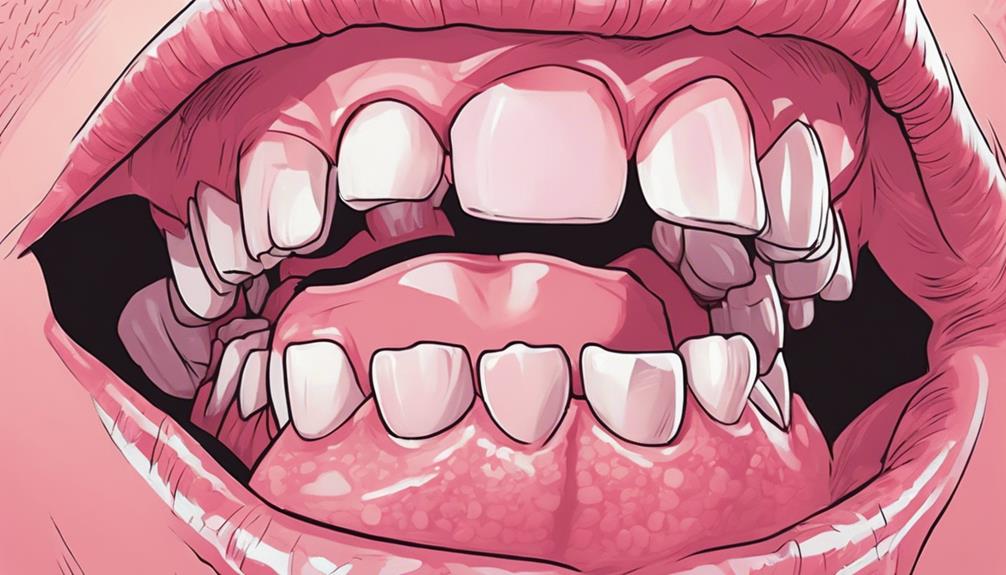If your baby is born with teeth, known as natal teeth, you're not alone; it happens in about 1 in 2,000 to 3,000 births. These teeth usually appear as small, underdeveloped lower central incisors. While their exact cause is still unclear, genetic factors may play a role. Natal teeth can cause feeding difficulties or injuries to the tongue due to sharp edges, so keeping an eye on them is important. Consulting a pediatric dentist can help manage potential complications and guarantee your baby stays safe. To learn about care and treatment options, keep exploring this topic. Proper monitoring of natal teeth is also essential as it may affect the baby teeth development. In some cases, the natal teeth may need to be removed to prevent any issues with the development of the permanent teeth. Your pediatric dentist can provide guidance on the best course of action for your baby’s dental health and development. Understanding the potential impact of natal teeth on baby teeth development will help you make informed decisions for your child’s oral care.
Key Takeaways
- Natal teeth are rare, occurring in approximately 1 in 2,000 to 3,000 live births, typically appearing as lower central incisors.
- These teeth are often small, underdeveloped, and may have discoloration, such as brown or yellow hues.
- Potential complications include feeding difficulties, tongue injuries, and risks of aspiration if teeth are loose.
- Early identification and consultation with a pediatric dentist are crucial for managing natal teeth and associated risks.
Overview of Natal Teeth
Natal teeth, which are present at birth in about 1 in 2,000 to 3,000 live births, often cause concern for new parents due to their unusual appearance and potential complications. If you have a baby with natal teeth, you might notice that these teeth often appear smaller and may have hypoplastic enamel, making them look different from typical primary teeth. While they can resemble normal teeth, their loose attachment can lead to various issues.
Feeding difficulties can arise, as these teeth may cause irritation to your baby's tongue or gums. There's also a risk of aspiration if the teeth become loose, which can be frightening for any parent. Understanding that these teeth can be associated with certain medical conditions, like cleft lip and palate, helps you prepare for potential concerns.
It's essential to consult a pediatric dentist if you notice natal teeth in your baby. They can assess the situation, discuss any necessary interventions, and help ease your worries.
With the right guidance, you can navigate the challenges that come with having a baby with natal teeth, ensuring your little one remains healthy and happy. One of the first steps in handling natal teeth is understanding the baby teething timeline. This way, you can anticipate when your baby will experience teething discomfort and be prepared to provide comfort and relief. With the right support from healthcare professionals and loved ones, you can successfully manage the unique challenges that come with natal teeth and ensure your baby’s well-being.
Causes of Natal Teeth

The exact cause of natal teeth remains unclear, but genetic factors likely play a significant role, as family history has been reported in a notable percentage of cases. Studies suggest that if someone in your family has experienced natal teeth, you might be more susceptible to having a baby with them, too.
Additionally, natal teeth are more common in infants with certain medical conditions. If your child has conditions like cleft lip and palate, Sotos syndrome, or Ellis-van Creveld syndrome, there's a higher chance they could be born with natal teeth.
Malnutrition during pregnancy and various environmental factors may also contribute to tooth development irregularities that lead to natal teeth.
Curiously, research shows that females are statistically more likely to be born with them compared to males, hinting at a possible gender predisposition.
Irregularities in dentin formation, which is essential for healthy tooth development, can further explain the occurrence of natal teeth. Understanding these causes can help you prepare for the unique journey of having a child born with teeth.
Characteristics of Natal Teeth

Born with teeth, your baby might have small, loose, and underdeveloped teeth that resemble primary teeth but often lack a robust structure. These natal teeth usually appear as lower central incisors and can differ in shape, size, and coloration, sometimes showing brown or yellow hues. It's essential to recognize that natal teeth are relatively rare, affecting about 1 in 2,000 to 3,000 births.
Here's a quick overview of the characteristics of natal teeth:
| Characteristic | Description |
|---|---|
| Size | Typically small and underdeveloped |
| Structure | Often lacks robust root formation |
| Common Appearance | Usually lower central incisors |
| Coloration | May show brown or yellow hues |
Due to their lack of proper root formation, these teeth can become mobile and may irritate your baby's tongue or gums. While they can sometimes be associated with genetic conditions like Sotos syndrome or cleft lip and palate, they're generally not linked to serious medical issues. Understanding these characteristics helps you better manage your baby's dental health.
Complications and Risks

When your baby has natal teeth, you might face several complications.
Feeding can become tricky, as sharp edges may irritate their tongue and gums, leading to discomfort.
Additionally, there's a risk of aspiration if those teeth are loose, making it essential to monitor their condition closely.
Feeding Difficulties
Natal teeth can create significant feeding difficulties, leading to discomfort for both infants and their mothers during breastfeeding. The sharp edges of these teeth may cause lacerations to your nipple, resulting in pain and potential infection.
As you navigate breastfeeding, you might notice that your infant struggles to latch properly due to the abnormal positioning or mobility of the natal teeth. This can cause further complications, such as tongue injuries, making feeding even more challenging.
Your infant may also experience discomfort while feeding, which can lead to a reduced milk intake. This reduction can raise concerns about weight gain and overall nutrition. It's crucial to keep an eye on your baby for signs of feeding distress, such as excessive drooling, refusal to feed, or increased fussiness. These symptoms may indicate complications related to their natal teeth.
If you encounter ongoing feeding difficulties, consider consulting a pediatrician or lactation consultant for advice. They can help you find solutions to ease breastfeeding challenges and guarantee your infant gets the nourishment they need. Addressing these issues early can help both you and your baby have a more positive feeding experience.
Aspiration Risks
Feeding difficulties can lead to increased aspiration risks in infants with natal teeth, especially if those teeth are loose or sharp. When feeding, the potential for these teeth to become dislodged heightens the risk of inhalation, which can obstruct the airway. If you're breastfeeding, a poor latch exacerbates the problem, as shifting teeth can cause accidental aspiration.
To safeguard your baby, keep an eye out for these signs of aspiration:
- Coughing during or after feeding
- Choking episodes
- Difficulty breathing
- Unusual fussiness or agitation while feeding
It's vital to monitor your infant closely for these symptoms. If you notice any concerning signs, consult a pediatric dentist promptly. They can assess the stability of the natal teeth and recommend necessary interventions to reduce aspiration risks.
Addressing these issues early on helps guarantee your baby's safety during feeding, allowing for a more enjoyable breastfeeding experience. Remember, while natal teeth can be a unique occurrence, being proactive about potential complications is critical for your child's health.
Tongue Injuries
Tongue injuries can happen if your baby has natal teeth, especially if those teeth are sharp or poorly formed. These injuries can lead to cuts or abrasions on your infant's tongue, and the risk increases during breastfeeding. While latching or feeding, your baby might inadvertently bite down on their tongue, resulting in painful injuries.
Moreover, natal teeth can cause discomfort and irritation in the oral cavity, which may further heighten the chances of tongue injuries. If you notice signs of injury, like swelling, redness, or visible cuts, it's vital to take action to maintain your baby's oral health.
Regularly checking your baby's mouth can help you catch any issues early. Consulting a pediatric dentist is essential for evaluating and managing natal teeth. A pediatric dentist can provide guidance on how to minimize the risk of tongue injuries and address any complications that may arise from those teeth.
Diagnosis of Natal Teeth

A physical examination reveals visible teeth in infants suspected of having natal teeth, often accompanied by a review of their medical history. Your pediatrician will perform a thorough assessment to confirm the diagnosis. Here's what you can expect during this process:
- Visual Inspection: The doctor examines the mouth for any visible natal teeth, which are typically discolored and underdeveloped.
- Medical History Review: A detailed history helps identify any associated medical conditions, such as cleft lip or palate, which may increase the likelihood of natal teeth.
- X-ray Evaluation: In some cases, X-rays may be used to evaluate the presence of root structures and ascertain the teeth aren't causing harm.
- Symptom Assessment: The doctor considers any symptoms, such as pain or difficulty feeding, to determine the need for further action.
Understanding the diagnosis of natal teeth is essential for making informed decisions about your infant's health.
Early identification can help you and your healthcare provider manage any potential complications effectively.
Management and Treatment

Natal teeth require careful management to prevent complications like feeding difficulties and oral injuries. If your baby has natal teeth, it's important to monitor them closely. Pediatric dentists often recommend regular check-ups to assess the teeth's stability and root structure. If the teeth are loose or lack proper roots, extraction might be necessary to minimize the risk of aspiration or injury.
Maintaining good oral hygiene is essential. You should wipe your baby's gums and teeth with a damp cloth to reduce discomfort and avoid complications. If your infant shows signs of irritation or feeding difficulties, don't hesitate to seek medical advice. This guarantees you address any issues promptly and effectively.
Pediatric dentistry plays a significant role in managing natal teeth. Dentists may use X-rays to evaluate root structures and determine the best course of action tailored to your child. In some cases, stable natal teeth may not require intervention, but regular monitoring is still important.
Seeking Professional Care

If your baby has teeth at birth, scheduling an appointment with a pediatric dentist is vital to assess their structure and identify any potential complications. Natal teeth can lead to various issues, and seeking professional care is important for your child's health.
Here are some key reasons to consult a pediatric dentist:
- Feeding Difficulties: If your baby struggles to feed, it could be due to the natal teeth causing discomfort or injury.
- Tongue Injuries: Natal teeth can pose a risk of injuring your baby's tongue, leading to further complications.
- Signs of Infection: Look for redness, swelling, or discharge around the teeth, which may indicate an infection requiring immediate attention.
- Dental X-rays: The dentist might recommend X-rays to evaluate the root structures and any associated risks.
Early intervention by a pediatric dentist can help prevent choking hazards and other dental issues later in life. By addressing these concerns promptly, you guarantee your baby's well-being and confidence as they grow.
Don't hesitate to seek professional guidance if you notice any of these signs!
Frequently Asked Questions
What Does It Mean if a Baby Is Born With Teeth?
If your baby's born with teeth, it often indicates a rare dental condition known as natal teeth. You should consult a pediatric dentist to understand potential risks and guarantee your baby's health and safety.
Do Neonatal Teeth Need to Be Removed?
When tiny pearls emerge early, you might wonder if they should stay or go. If they're loose or risky, removing them could be wise; otherwise, monitoring can guarantee your little one's smile stays safe.
Will Natal Teeth Fall Out?
Natal teeth don't always fall out naturally. Their stability and structure determine their fate. If they're loose or poorly developed, you might need to consult a dentist for safe removal to avoid complications.
What Causes Babies to Get Teeth Early?
Like a flower blooming too soon, babies might get teeth early due to genetic factors, environmental influences, or developmental irregularities. These elements play a role in the timing of your little one's dental arrival.
Conclusion
So, you've welcomed a little one into the world, only to find they've skipped the crawling phase and come out with a full set of teeth. Isn't that just the irony of parenting?
While it may seem like a novelty, remember that natal teeth can bring complications too. Staying informed and seeking professional care can help guarantee your baby's smile stays healthy.
After all, who knew your baby would be ready for dental hygiene before they even learned to crawl?









